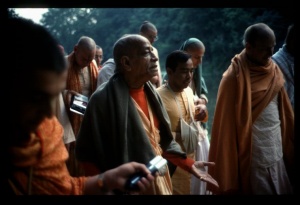SB 10.47.58: Difference between revisions
m (1 revision(s)) |
No edit summary |
||
| Line 1: | Line 1: | ||
{{info | {{info | ||
|speaker=Uddhava | |speaker=Uddhava | ||
|listener= | |listener=gopīs | ||
}} | }} | ||
[[Category:Srimad-Bhagavatam - Canto 10 Chapter 47]] | |||
[[Category:Bhagavatam Verses Spoken by Uddhava - Vanisource|104758]] | |||
<div style="float:left">'''[[Srimad-Bhagavatam]] - [[SB 10|Tenth Canto]] - [[SB 10.47: The Song of the Bee|Chapter 47: The Song of the Bee]]'''</div> | |||
<div style="float:right">[[File:Go-previous.png|link=SB 10.47.57]] '''[[SB 10.47.57]] - [[SB 10.47.59]]''' [[File:Go-next.png|link=SB 10.47.59]]</div> | |||
{{RandomImage}} | |||
{{SBnotice}} | |||
==== TEXT 58 ==== | ==== TEXT 58 ==== | ||
<div | <div class="verse"> | ||
etāḥ paraṁ tanu-bhṛto bhuvi gopa-vadhvo | :etāḥ paraṁ tanu-bhṛto bhuvi gopa-vadhvo | ||
govinda eva nikhilātmani rūḍha-bhāvāḥ | :govinda eva nikhilātmani rūḍha-bhāvāḥ | ||
vāñchanti yad bhava-bhiyo munayo vayaṁ ca | :vāñchanti yad bhava-bhiyo munayo vayaṁ ca | ||
kiṁ brahma-janmabhir ananta-kathā-rasasya | :kiṁ brahma-janmabhir ananta-kathā-rasasya | ||
</div> | </div> | ||
| Line 17: | Line 22: | ||
==== SYNONYMS ==== | ==== SYNONYMS ==== | ||
<div | <div class="synonyms"> | ||
''etāḥ''—these women; ''param''—alone; ''tanu''—their bodies; ''bhṛtaḥ''—maintain successfully; ''bhuvi''—on the earth; ''gopa-vadhvaḥ''—the young cowherd women; ''govinde''—for Lord Kṛṣṇa; ''eva''—exclusively; ''nikhila''—of all; ''ātmani''—the Soul; ''rūḍha''—perfected; ''bhāvāḥ''—ecstatic loving attraction; ''vāñchanti''—they desire; ''yat''—which; ''bhava''—material existence; ''bhiyaḥ''—those who are afraid of; ''munayaḥ''—sages; ''vayam''—we; ''ca''—also; ''kim''—what use; ''brahma''—as a ''brāhmaṇa'' or as Lord Brahmā; ''janmabhiḥ''—with births; ''ananta''—of the unlimited Lord; ''kathā''—for the topics; ''rasasya''—for one who has a taste. | |||
</div> | </div> | ||
{{SBcollapse}} | |||
==== TRANSLATION ==== | ==== TRANSLATION ==== | ||
<div | <div class="translation"> | ||
[Uddhava sang:] Among all persons on earth, these cowherd women alone have actually perfected their embodied lives, for they have achieved the perfection of unalloyed love for Lord Govinda. Their pure love is hankered after by those who fear material existence, by great sages, and by ourselves as well. For one who has tasted the narrations of the infinite Lord, what is the use of taking birth as a high-class brāhmaṇa, or even as Lord Brahmā himself? | [Uddhava sang:] Among all persons on earth, these cowherd women alone have actually perfected their embodied lives, for they have achieved the perfection of unalloyed love for Lord Govinda. Their pure love is hankered after by those who fear material existence, by great sages, and by ourselves as well. For one who has tasted the narrations of the infinite Lord, what is the use of taking birth as a high-class brāhmaṇa, or even as Lord Brahmā himself? | ||
</div> | </div> | ||
| Line 31: | Line 36: | ||
==== PURPORT ==== | ==== PURPORT ==== | ||
<div | <div class="purport"> | ||
Śrīla Viśvanātha Cakravartī explains that here the term brahma-janmabhiḥ, "brahminical births," refers to the threefold birth by (1) seminal parenthood, (2) sacred-thread initiation and (3) sacrificial initiation. These cannot compare to pure Kṛṣṇa consciousness. In fact, Śrī Uddhava, who spoke this verse, took birth as a pure brāhmaṇa, but he deprecates this position in comparison to that of the exalted gopīs. | Śrīla Viśvanātha Cakravartī explains that here the term ''brahma-janmabhiḥ'', "brahminical births," refers to the threefold birth by (1) seminal parenthood, (2) sacred-thread initiation and (3) sacrificial initiation. These cannot compare to pure Kṛṣṇa consciousness. In fact, Śrī Uddhava, who spoke this verse, took birth as a pure brāhmaṇa, but he deprecates this position in comparison to that of the exalted gopīs. | ||
</div> | </div> | ||
__NOTOC__ | </div> | ||
</div> | |||
<div style="float:right">[[File:Go-previous.png|link=SB 10.47.57]] '''[[SB 10.47.57]] - [[SB 10.47.59]]''' [[File:Go-next.png|link=SB 10.47.59]]</div> | |||
__NOTOC__ | |||
__NOEDITSECTION__ | |||
Revision as of 15:59, 23 May 2021

A.C. Bhaktivedanta Swami Prabhupada
Please note: The synonyms, translation and purport of this verse were composed by disciples of Śrīla Prabhupāda
TEXT 58
- etāḥ paraṁ tanu-bhṛto bhuvi gopa-vadhvo
- govinda eva nikhilātmani rūḍha-bhāvāḥ
- vāñchanti yad bhava-bhiyo munayo vayaṁ ca
- kiṁ brahma-janmabhir ananta-kathā-rasasya
SYNONYMS
etāḥ—these women; param—alone; tanu—their bodies; bhṛtaḥ—maintain successfully; bhuvi—on the earth; gopa-vadhvaḥ—the young cowherd women; govinde—for Lord Kṛṣṇa; eva—exclusively; nikhila—of all; ātmani—the Soul; rūḍha—perfected; bhāvāḥ—ecstatic loving attraction; vāñchanti—they desire; yat—which; bhava—material existence; bhiyaḥ—those who are afraid of; munayaḥ—sages; vayam—we; ca—also; kim—what use; brahma—as a brāhmaṇa or as Lord Brahmā; janmabhiḥ—with births; ananta—of the unlimited Lord; kathā—for the topics; rasasya—for one who has a taste.
Translation and purport composed by disciples of Śrīla Prabhupāda
TRANSLATION
[Uddhava sang:] Among all persons on earth, these cowherd women alone have actually perfected their embodied lives, for they have achieved the perfection of unalloyed love for Lord Govinda. Their pure love is hankered after by those who fear material existence, by great sages, and by ourselves as well. For one who has tasted the narrations of the infinite Lord, what is the use of taking birth as a high-class brāhmaṇa, or even as Lord Brahmā himself?
PURPORT
Śrīla Viśvanātha Cakravartī explains that here the term brahma-janmabhiḥ, "brahminical births," refers to the threefold birth by (1) seminal parenthood, (2) sacred-thread initiation and (3) sacrificial initiation. These cannot compare to pure Kṛṣṇa consciousness. In fact, Śrī Uddhava, who spoke this verse, took birth as a pure brāhmaṇa, but he deprecates this position in comparison to that of the exalted gopīs.